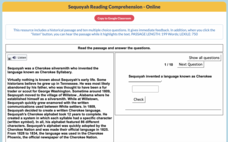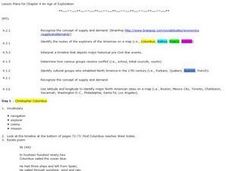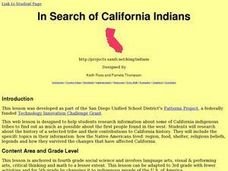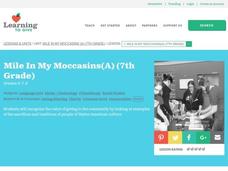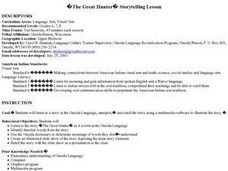Curated OER
History of the American Family
Students discover the history of the American family and the affects of immigration. In addition, they examine the contributions of minority families to American culture. In groups, students explore the pros and cons of dual-income...
K12 Reader
What is a Tribal Government?
How are tribal governments similar to local or state governments? After reading a short article on tribal governments, individuals draw evidence from the provided article to respond to this reading comprehension question.
Curated OER
Anishinabe - Ojibwe - Chippewa: Culture of an Indian Nation
Students investigate the American Indian tribe of the Chippewa. They identify the different names of the Anishinabe/Ojibwe/Chippewa nation, conduct a research project, explore various websites, and present their group research projects.
Mr. Nussbaum
Sequoyah
Test scholars' comprehension with a 10-question interactive. Learners read a short informative text about Sequoyah, a Cherokee silversmith, who invented the language Cherokee Syllabary, then answer fill-in-the-blank and multiple-choice...
Curated OER
We Were Here First
Students explore the legal and historical experience of native peoples living in the United States. They write a letter to their United States senator commenting on the Hawaiian bill using information gathered during their research.
Curated OER
Pottery-making Methods
Students become experimental archaeologists using three methods of pottery making before the invention of the pottery wheel.
Curated OER
American Civil War Lesson Plans
Civil War lesson plans can get students thinking about, and discussing issues related to history, politics, and even photography.
Curated OER
Health Enhancement Traditional Games
Fourth graders participate in Tribal games. In this tribal nations activity, 4th graders play games that help improve on the physical skills for survival, invention, and problem solving. They discuss what is needed for survival and how...
Curated OER
An Age of Exploration
Students investigate U.S. history by examining North American timelines. In this American exploration instructional activity, students research the events that led to Columbus finding America and participate in a jeopardy game regarding...
Curated OER
In Search of California Indians
Fourth graders research information about some of California indigenous tribes to find out as much as possible about the first people found in the west. They research about the history of a selected tribe and their contributions to...
Curated OER
Mile in My Moccasins
Students recognize the value of giving to the community by looking at examples of sacrifices and traditions of Native Americans. In this Native American lesson, students given examples of philanthropic deeds of Native American people....
Curated OER
Navajo Shoe Game
Students in a Navajo community research the traditional shoe game. They interview community elders and find out how shoe game is played and the songs that are sung while playing it. They attend a shoe game and compare their research to...
Curated OER
Grinding Stones # 2
Second graders discuss and explore the Navajo tradition of grinding with stones. They observe how the grinding stone is used and then they practice using the grinding stones themselves.
Curated OER
The Great Hunter Storytelling Lesson
Middle schoolers listen to and use resources to translate an old Oneida story told in the Oneida language by an elder in the community. They then develop an illustrated slideshow of the story.
Curated OER
Pellagra Case Study
Students examine a case study documenting the experience of three teens in the 1920's era with a disease (Pellagra) which was prevalent throughout the United States, most particularly in persons with a corn based diet. They create a...
Curated OER
News Interviews of Historical Figures During the Indian Wars
Pupils examine the lives of important historical figures. Using primary source documents, they develop a list of questions to ask the figure if they were still alive. In groups, they discover information about the other historical...
Curated OER
Letters from the Japanese American Internment
Young scholars make deductions about life in an internment camp by reading and comparing letters written to Clara Breed. Along the way, they consider the advantages of looking at a historical event from the multiple points of view of...
Curated OER
The History of Thanksgiving Day
Third graders study the history of Thanksgiving. In this holiday lesson plan, 3rd graders read about the history of Thanksgiving, complete vocabulary activities, and write a journal entry from the point of view of someone who lived...
Curated OER
An Introduction to the Little Shell Tribe
Students engage in a lesson to find information about the history of the Little Shell Tribe. The concepts of sovereignty and treaty are defined in relation to the information gathered using research methods. They answer the inquiry of...
Curated OER
Din Clan System
The students use the clan system to identify relationships among the Din people and begin a conversation with the elders starting with their own clans. Students work on building stronger relationships with community members.
Curated OER
Create a Display
Students identify mollusks, create a display, research a particular species, and present their findings to the class. They collect and bring in a shell of choice from their local beach. Then, students label his or her shell with the...
Curated OER
Country Locations
First graders read a story and locate where the countries in the story are located. In this traditions lesson, 1st graders explore food dishes from different countries and discuss where they are located. Students tell their favorite...
Curated OER
Metis - Grade 10
Tenth graders investigate the organization and purpose of the Metis. In this Canadian history lesson, 10th graders watch "Metis Settlements," and then participate in talking circles sharing their impressions of the video.
Curated OER
Foreign Miners
Pupils examine primary source documents from miners who went to California in the search of gold. They compare and contrast the letters they read and discuss what types of discrimination still exists today.





